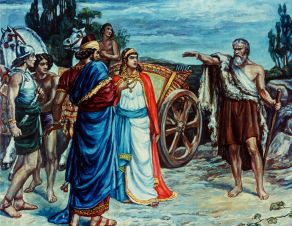A sermon from The Rev. Linda Griggs: 2 Kings 2: 1-2, 6-14 and Luke 9:51-62
From Midrash to Gospel:
“No one who puts a hand to the plow and looks back is fit for the Kingdom of God.”
We have been hearing in recent weeks about the way the imagination helps us to construct a picture of God. The imagination also helps us to ‘fill in the gaps’ as we engage with a Bible passage—to see how the Spirit speaks to us through the text as we wonder what is going on between the lines. This is a version of the ancient tradition of commentary that the Jewish household knows as midrash. Midrash at its core understands that inspiration in Scripture doesn’t just come in the writing—it also comes in the reading and pondering.
So in the spirit of midrash, we enter the world of Elijah and Elisha, wherein there are many gaps to pique our interest.
Apparently, Elijah and Elisha go way back, though Kings make only two references to them when they are together; one is in today’s passage, in which Elijah ascends, and then a few chapters earlier when they meet each other for the first time. In that episode in First Kings God tells Elijah to anoint Elisha son of Shaphat of Abel-meholah as prophet in his place. So Elijah seeks out Elisha and finds him…at the plow, toiling along behind a brace of oxen. In what seems a strange way of introducing himself, Elijah throws his mantle over Elisha and keeps on walking without saying a word. (Take a second to picture this.) Elisha may or may not have found it surprising to have someone’s cloak tossed on him in the middle of a field, but apparently he knows an invitation when he sees one, and goes running eagerly after Elijah, saying, “Let me kiss my father and my mother, and then I will follow you.” Elijah gives him permission to go back but bids him be mindful of his call. And Elisha shows every evidence of understanding the implications: He promptly slaughters the oxen, cooks them over a fire made from the yoke used to guide them, feeds his community, and heads off with Elijah without a backward glance: “Then he set out and followed Elijah, and became his servant.” Elijah’s invitation transformed Elisha from farmer into prophet’s servant in the space of a breath. He (somewhat) literally burned his past to move into an unknown future.
And that is the last we hear of this pair—as a pair—for several chapters. There is some speculation that the separate Elisha and Elijah story cycles might have pertained to a single figure, not two, but at some point in the various tellings it became important to show them in relationship. It is an invitation to imagine. How did they get along? Was Elijah grumpy in the mornings? Did Elisha ask too many stupid questions? Where did they go and what did they talk about in their travels?
Interestingly the lesson we heard today also leaves gaps; the Lectionary leaves out a few verses so that we miss the fact that Elijah stops three times—before Bethel, Jericho, and the Jordan and asks Elisha to stay behind, and each time Elisha refuses. More important, today’s passage leaves out the fact that other prophets twice say to Elisha, “Do you know that today the Lord will take your master away from you?” And Elisha says, ”Yes, I know; be silent.” So he knows. But he doesn’t want to talk about it. Is he in denial? Is he unwilling to confront his master? The tension builds as the journey continues.
After Elijah uses his rolled-up mantle to channel Moses and the pair crosses the mmiraculously partedJordan, Elijah asks what he can do for Elisha, and Elisha requests a double share of his master’s spirit. This is a traditional way of saying that he would like to succeed Elijah as a son, no longer as just his servant. Elijah leaves the matter in God’s hands. And in response God affirms Elisha’s request, granting him a dramatic vision of his master being carried away in a flaming maelstrom. As the mantle of Elijah falls upon Elisha once again, he cries, “Father! Father! The chariots of Israel and its horsemen!” In a flash of both boundless joy, and plunging sorrow, Elisha receives his new identity as son and prophet of the divine Word, even as Elijah leaves him, alone and bereft by the Jordan, tearing his own garment in his grief.
I always want to take a breath after this scene, just to absorb the visceral and emotional impact. But we aren’t given a minute. Elisha takes up the mantle and speaks. And here again, we can only imagine. Is he angry as he demands, “Where is the Lord, the God of Elijah?”, slamming the rolled up mantle on the water? Or is he grateful and confident in his new-found role as Prophet?
Perhaps it’s something between the two, as conflicting emotions continue to whirl inside of him. Because it is here that we can see the crux of the story; we see what happens at the intersection of love and loss. This is the place where Elisha assumes his identity. It’s where he finds his vocation.
Now. Hear again the disturbing words of Jesus in this new context: “Foxes have holes and birds have nests…Let the dead bury their dead…No one who puts his hand to the plow and looks back…” Luke’s comparison of the Gospel passage to Elijah is deliberate, as we see references in both stories to an approaching ascension, and as we see both Elijah and Jesus journey a bit, then stop, then journey again. Both Jesus and Elijah are intent upon their destiny. And as we listen to Jesus alluding to the great prophets we can see that Jesus is not just being randomly cruel in challenging his would-be followers. He needs them to understand that God has always asked for a realignment of priorities and that now matters are coming to a head as he sets his face toward Jerusalem. Those who would follow will need to redefine their notions of home and family, even life and death, as they take on the mantle of discipleship. Elijah and Elisha knew it, and that is why Luke draws the connection. Great love and great loss. Vocation and transformation.
I love the fact that one of the most visible symbols of St. Martin’s is a cloak. Basically, it is the same as a mantle. Certainly, the cloak is a symbol of our parish’s identity of service and compassion in the tradition of St. Martin of Tours. In the context of today’s scripture I invite you to imagine an expanded vision of our cloak—to imagine St. Martin’s mantle resting upon each of us. Imagine it enfolding us in our vocation as kingdom dreamers, standing in the intersection where Elisha stood and where Jesus calls; in that place where loss and brokenness meet the love and compassion of God. Imagine joyfully and prayerfully bearing that mantle in a world that is in desperate need of some countercultural Christian hope; Imagine that mantle empowering us as a community of healing and wholeness that is articulated in all of our relationships and in everything we do, within and outside of these walls.
Admittedly it’s a broad and challenging invitation. What exactly will this mantle look like? How will it fit? God is leaving it to our imagination to weave and tailor it.
And it’s up to us to fill in the gaps

 What happens next is a threshold moment; Elijah’s startling leap of imagination to behold God, not in the dramatic events of nature: wind, earthquake and fire, but:
What happens next is a threshold moment; Elijah’s startling leap of imagination to behold God, not in the dramatic events of nature: wind, earthquake and fire, but:  after, yet, at many levels, Paul continues to be who he is, a Hellenic, Pharisee Jew, now a
after, yet, at many levels, Paul continues to be who he is, a Hellenic, Pharisee Jew, now a 
 fascination at gazing at a black and white drawing of a woman being thrown out of a window to an awaiting crowd of men and excited-looking dogs. I must have asked someone, probably my grandmother, who was this woman being thrown from the upstairs window? I learned her name was Jezebel. To this day, the very mention of her name brings back with vivid accuracy this simple pen and ink drawing.
fascination at gazing at a black and white drawing of a woman being thrown out of a window to an awaiting crowd of men and excited-looking dogs. I must have asked someone, probably my grandmother, who was this woman being thrown from the upstairs window? I learned her name was Jezebel. To this day, the very mention of her name brings back with vivid accuracy this simple pen and ink drawing. the Lord comes to him telling him to go down to meet King Ahab and say to him: Thus says the Lord:
the Lord comes to him telling him to go down to meet King Ahab and say to him: Thus says the Lord: